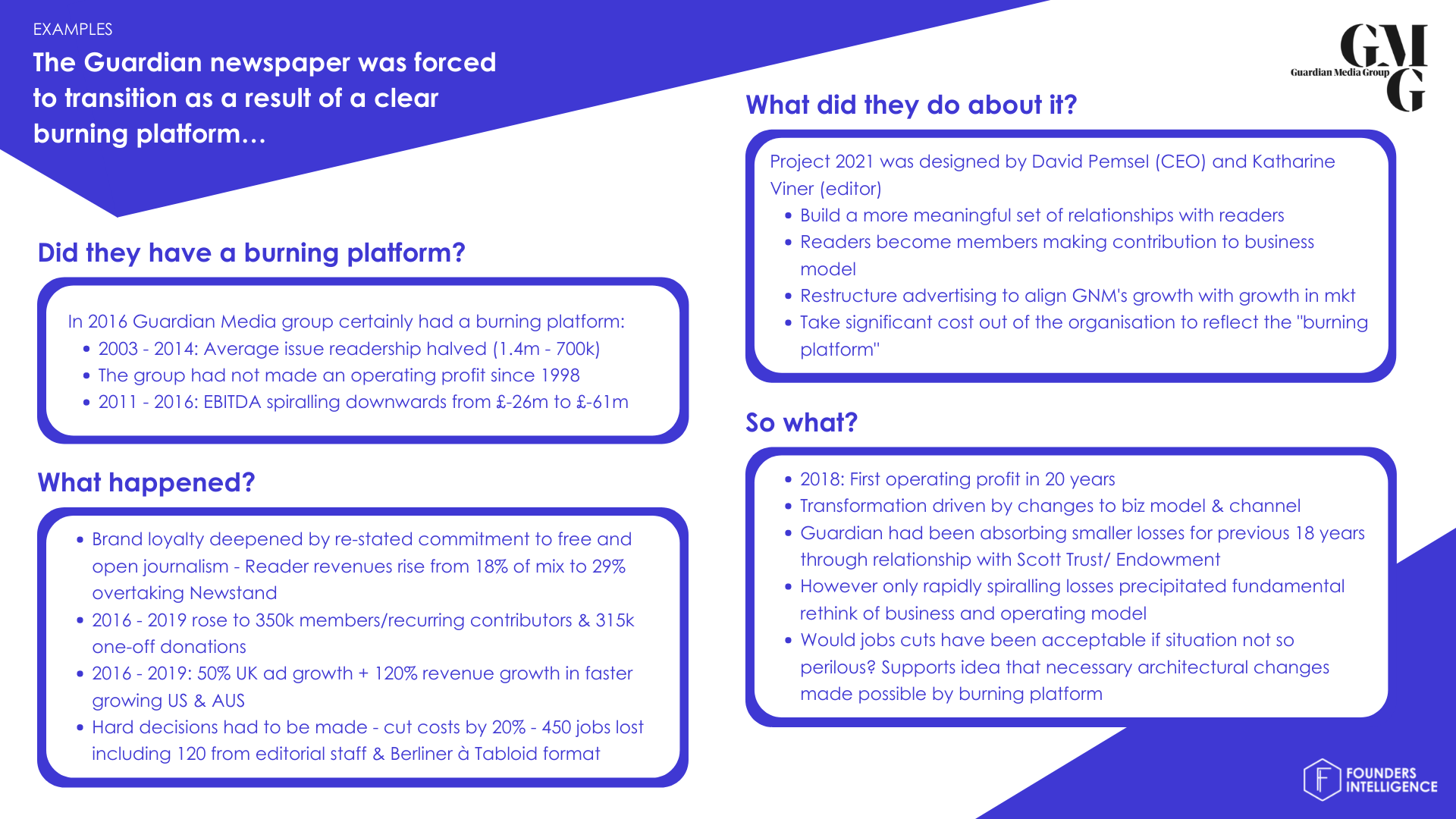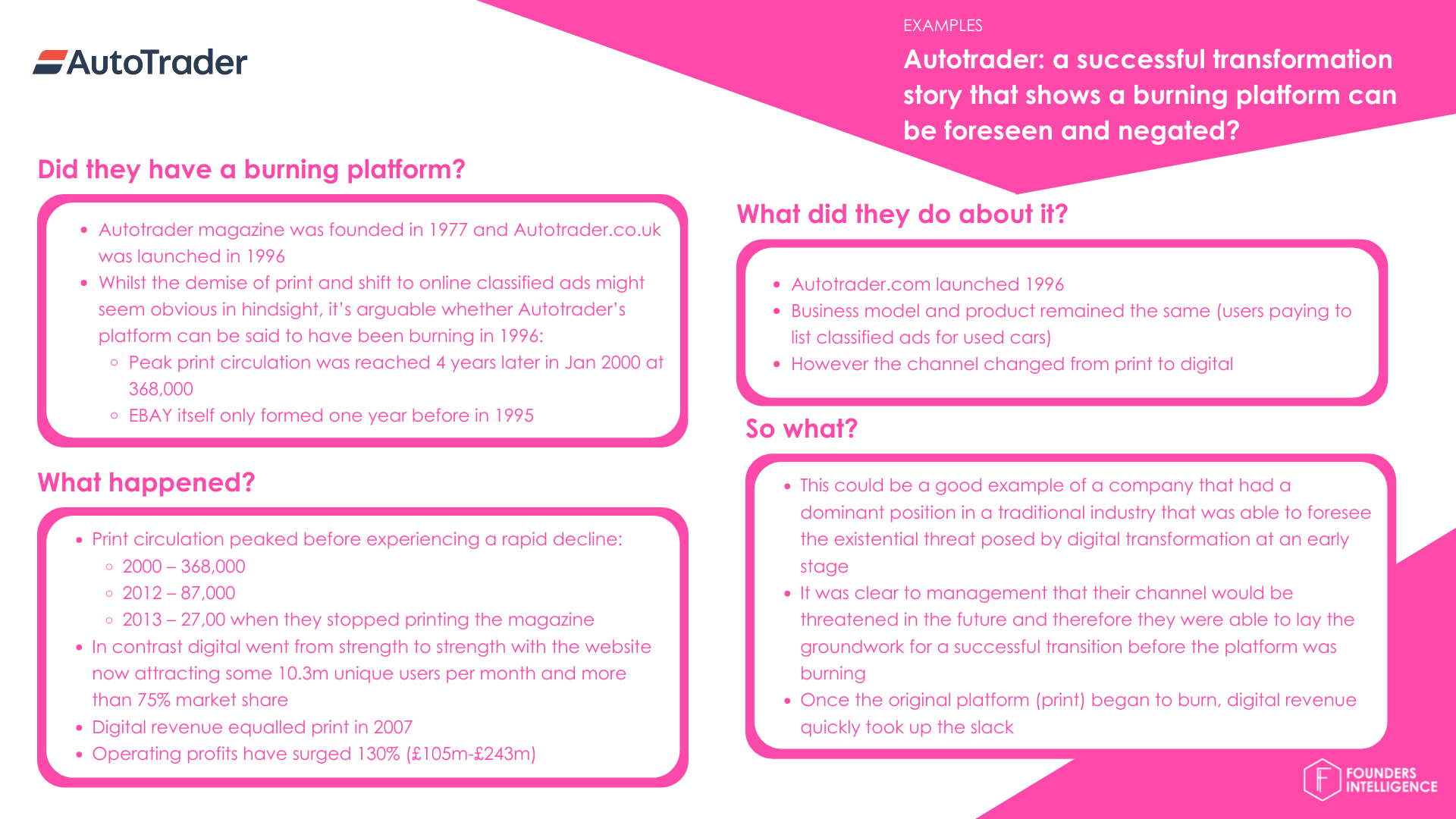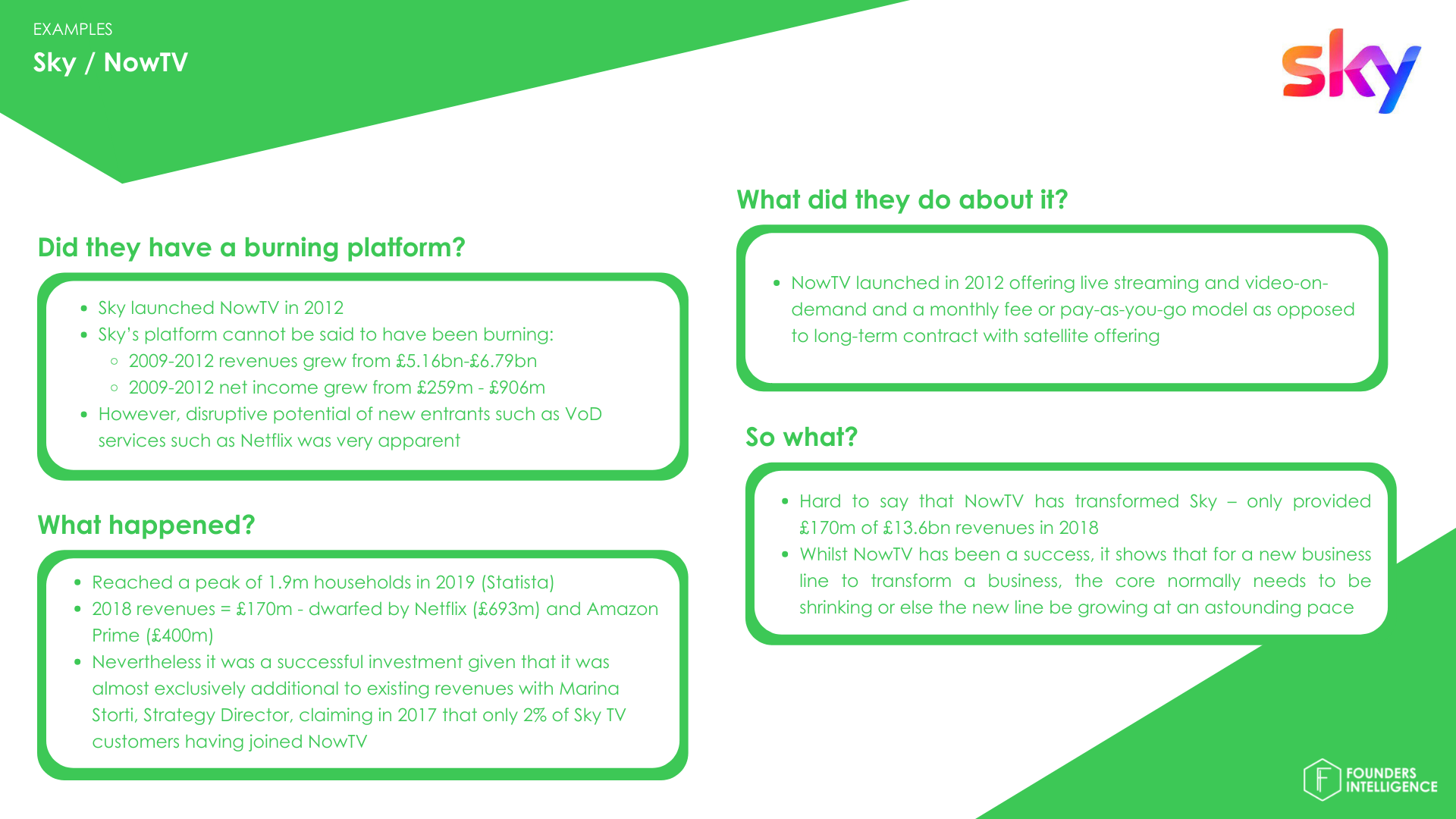The Importance Of A Burning Platform
You can’t change a big corporation without fear. That seems to be the dominant belief among CEOs.
But is it true?
Jeff Immelt, the former CEO of GE, used existential threat regularly as a means of trying to do just that. A quote from one of his seminars makes his position clear “Guys, if we don’t become the best technology company in the world, we’re doomed, we’re dead.” And when I talked about digital industrial, I’d say, “There’s no Plan B. There’s no other way to get there.”
A number of CEOs we have worked with over the years are of the same belief partly because there are seemingly so many companies that, in the face of imminent and extreme threat, have pulled off wholesale transformations (more on them below). That’s clear in retrospect but often the state of the metaphorical ‘platform’ is hard to read – is it tepid, warm, smouldering?
The reality for many corporates is that they are looking at a myriad of fuzzy possible futures with as much perceivable opportunity as threat, and a lot of unanswered questions. What technologies will emerge? What will our competition do? What will our customers want? There is plenty of room for interpretation and more often than not for our clients the threat of imminent extinction is not so obvious.
That doesn’t stop the more innovation minded CEOs wanting burning platforms. They know that ‘if it’s not broken why fix it’ is a strong argument in a board room, and face strong inertia to stick with existing plans when quarterly results are king and risk management is the name of the game. Naturally enough, they believe the creation of a burning platform will help them create the impetus to change.
As such, we do at times find ourselves in the position of being asked to create the burning platform narrative for a CEO who believes in the need for change, even when there isn’t an obvious one. This pressure has forced us to ask ourselves ‘how important is the burning platform to catalysing transformative change’ and ‘and is this inferno really a compelling narrative for change’?
A few definitions first to help frame the debate:
- For burning platform I like this definition: ‘The systemic challenges to a business’s operating model are so serious that a radical change of strategy is necessary in order to avoid the company’s imminent demise’.
- As for transformative change, for us this means the whole system of an organisation needs to change. This often includes the product, the distribution channels, the business model and the organisational structures needed to support that change.
Looking Into The Abyss
Looking at what has happened in media, we can see the role a burning platform plays in reinvention efforts. The wholesale disruption of the product, channel and business model brought about by the internet has forced all legacy media companies through radical change during the last twenty years. Many haven’t survived, but we can learn from those that have:
- Guardian – Had a burning platform – Pulled off a transformation. Their former CEO David Pemsel believes the burning platform played a powerful role (but so too did the positive mission that the Guardian stood for)

- Autotrader – Didn’t have a burning platform at the point of launching .com but read the tea leaves, acted early and reaped the rewards

- Sky – Didn’t really have a burning platform – Sky hasn’t really transformed as a whole, but has built a significant new revenue line, NowTV. One can assume the spectre of Netflix on the horizon played a role

These examples illustrate that there are many types of burning platform. Though these companies had different challenges, what they all had in common when making the changes outlined above were clear beliefs about what the future held for them.
Those beliefs helped them act decisively and avoid the fates of countless other traditional media companies – in particular, Autotrader is a great example of the value of building those beliefs (in their case, that Digital would become the predominant channel) early on.
Forming Beliefs: Seeing the Light
At Founders Intelligence, we spend a lot of time helping clients understand the importance of ‘beliefs’ in informing their innovation / transformation journeys. ‘Beliefs…….. are you serious?’ I hear you say. ‘How I can I chart the future of a huge public company on ‘beliefs’? We need data,’ it has been said. But the problem with needing hard data before making bold moves is that by that point it’s often too late.
I spent some time in a board meeting recently listening to a famous strategy consultancy presenting the data on the future of an industry.
Their intention was to impress upon the board the need to act before it was too late. It didn’t work: even over Zoom, the glaze in board members’ eyes was visible. This wasn’t because the work wasn’t good or well presented (it was both); rather, it was in down to a few factors:
- Macro data and forecasts are hard to take much from. Execs know that future-facing forecasts are much more art than science and they are usually presented with so many disclaimers or such wide ranges that they don’t offer a real point of view. Smart people know when art is dressed up as science and have a tendency to dismiss it
- Most people are fairly literal, they need examples to fully take something in
- Macro data analysis does not (and cannot) include one of the most important data sets for seeing possible futures and building beliefs around them: the activity of early stage start-ups and top venture investors
We have built a consultancy around this third point, so clearly I am biased – but hear me out on why. it’s not that founders are superhumans who know the future, we know from the failure rates that the majority will not realise their dreams. That said, their activity warrants particular attention because:
- Start-up founders and their VCs have put firm stakes in the ground on what they think the future of their industry will be, what products the world needs and what business models will thrive in that world. They have bet their careers and money on it, that’s a demonstration of conviction that no macro analysis can match. If you can spot a good founder and VC, that data set gets even more useful
Because start-ups are putting a stake in the ground, they are easier to agree or disagree with – and in doing so, build your own beliefs about your industry’s direction of travel.
In our experience, looking across a sizable number of start-ups in an industry and qualify and present the most compelling ones, you can get a diverse group of people to build their own beliefs on how ‘on fire’ (or not) their platform is. This makes it much easier to make some of the strategic choices needed.
Setting Your Organisation On Fire
But to return to our question: do you need a burning platform or not, and what to do if you haven’t got one.
I believe that to achieve wholesale core product and business model innovation you need really firm conviction about either the opportunity or the threat faced by your business. Without that conviction it is too hard to take the kind of bold steps needed to transform.
The example of AutoTrader shows us the value of picking up the signals early and seeing an opportunity to springboard in to the next phase of growth. It takes a very far sighted exec to do that and it requires them to have some firmly held beliefs on where their market is going, long before there is hard data to back them up.
It is also true that fear of obsolescence can be a powerful management tool. Even the indominable Mark Zuckerberg has left the Sun Microsystems sign up at Menlo Park as a reminder to his employees of the risks of complacency.
In isolation, however, fear is not enough. David Pemsel in his story of the Guardian transformation is clear that, although he made the existential threat clear to his whole organisation, he also went to great lengths to remind them of the importance of the mission of protecting the Guardian ‘to safeguard the journalistic freedom and liberal values of the Guardian free from commercial or political interference’.
A clear belief in the transformation your business needs, carried out by staff who believe in its mission, is a powerful combination.
At Founders Intelligence, we help major corporations access new growth opportunities by innovating around their business model and consumer propositions.
If you want to build belief that will shape your business’s future, get in touch for a chat on [email protected]



